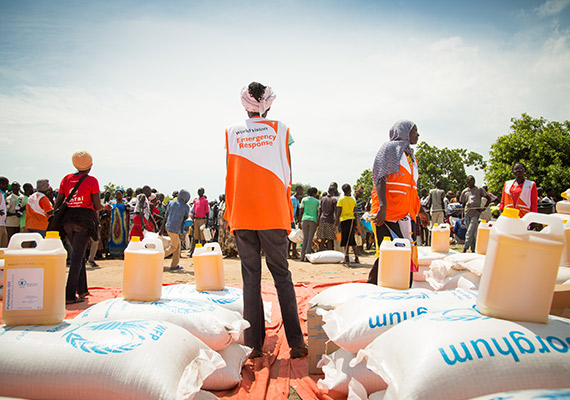
The awarding of the Nobel Peace Prize to the World Food Programme’s (WFP) is a greatly deserved acknowledgement of the organisation’s work to combat hunger and foster peace in the world’s most vulnerable communities.
The accolade also highlights the Herculean task for aid organisations currently combatting hunger and malnutrition fuelled by the COVID-19 pandemic that is ravaging livelihoods worldwide.
World Vision Australia acting CEO Graham Strong said as a partner of the WFP for 30 years – and its largest implementing partner for the past 16 years – World Vision was delighted by such a highly respected recognition of the WFP’s work.
“We partner with the WFP in many of the world’s toughest places, where the meal children receive through our school feeding programme is often their only source of nutrition,” Mr Strong said.
“Hunger robs children of their potential, gnaws away at hope, plunges millions into an uncertain future and can also fuel conflict in vulnerable communities. But working alongside the WFP, I’ve seen children’s lives transformed with more energetic, happier students, better results and a chance to succeed in life.”
Mr Strong said he hoped the award would shine a light on the growing task of combatting hunger as the COVID crisis cruels family incomes and complicates the logistics of food supply.
“Earlier this year the WFP warned the number of people facing was likely to double from 135 million to 265 million in 2020, due mostly to COVID-10 which has compounded the impact of conflicts, poverty and climate-related shocks.
“If governments of advanced economies and the world’s mega-wealthy – many of whom have prospered under COVID – do not act quickly and substantially, it will take organisations like ours decades, not years, to help these people recover.”
BACKGROUND
Between October 1, 2018 and September 30, 2019 alone, the WFP-World Vision partnership reached 10.7 million of the world’s most vulnerable, across 29 countries. More than 50 per cent of beneficiaries were children. Of the WFP’s support, 70 per cent was used to improve the lives of children and their families in the top 10 fragile contexts where World Vision works.








